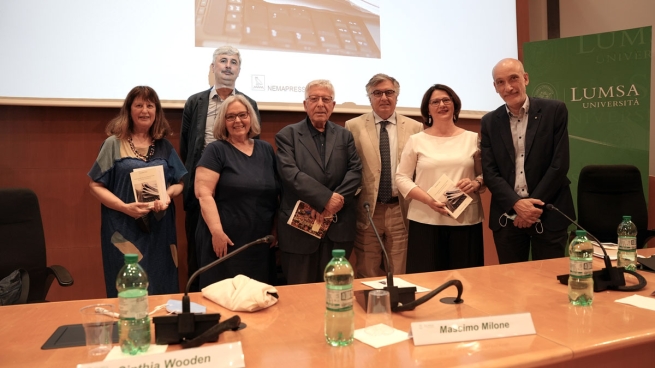Moderated by Neria De Giovanni, editorial director of "Nemapress," the event was attended by prominent figures from the world of culture, journalism, the Church, and the Congregation. The various speakers then took the floor, whose speeches illustrated the richness of Fr Costa's book and what and how many contributions the Salesian has made to Catholic journalism all these years.
The first was Massimo Milone, director of RAI Vaticano, who presented the Salesian's book as "a tracking shot through 40 years of history, journalism, customs, Church, society; it smells of Sicily, of print media, of culture, of Salesian hospitality and of the Salesian's own view of young people." Then, moving from the work to its author, the speaker described him as "teacher, priest, communicator, witness, animator of relationships and narrator of reality." Referring back to the Pope's message for the 56th World Communications Day, celebrated the previous Sunday, he captured Fr Costa's methodology as "a search for truth that always unfolds from listening," and grasped its specific feature in " communication as service", as ministry. Finally, recalling just a few of the many appointments Fr Costa attended, he noted that Fr Costa "wore out the soles of his shoes as a communicator, Pope Francis would like him very much."
Next, Cinthia Wooden, Head of "Catholic News Service," spoke, citing various contributions contained in the text to highlight some of the traits characteristic of Fr Costa's journalism: his insight and deep gaze, "looking out for what is new, as well as for what is new that will impact individuals and communities in the Church"; also, his interpretation of the journalist’s civic role, who knows how to "speak truth to the powers that be on behalf of the public and the little ones"; then, "the human factor added to the bare facts"; and the ability to look at reality from a broader perspective, as when, in the debate on Columbus Day, he was able to observe that the rights of the native cultures of South America were being forgotten.
The Vaticanist and editor-in-chief of Tg2, Enzo Romeo, celebrated both Fr Costa's "way of proposing the truth, which was never fundamentalist, but always fraternal" and "the humanity that always distinguished him," attitudes that can also be read against the light from the individual pieces, because "behind the articles are his life, his emotions, and his faith." Then reconnecting with the structure of the text, which is divided into thematic sections, the Vaticanist noted, "It starts with Don Bosco, then with youth and travel. It is not a simple list of things he wrote, but one finds in it what is profound in his person."
"Passion, fidelity, and generosity," on the other hand, are the three distinctive traits of Fr Costa's journalistic and educational work emphasized by Vania De Luca, TG3 Vaticanist. "I saw in this book a coherent path," she then added, glimpsing a common thread among the dozens of pieces in the book precisely in the ethical and civic approach to journalism - an approach that never changed on the part of the Salesian, but if anything, matured more and more, from his first experiences in the school newspaper to the most prestigious assignments in the publishing world.
Then, in a quick speech, Gianni Cardinale, Vaticanist of Avvenire, first called the book "a fitting tribute to the life and witness of Father Giuseppe," which gathers "valuable information, which cannot be found by surfing the web"; then he noted that Fr Costa's contribution to journalism, although celebrated in these first 40 years, still continues and remains alive and active; finally, he also congratulated the publisher for the quality of the text's layout, which is also useful as a source of reference for current and future media and news professionals.
In conclusion, the author of the book, Fr Giuseppe Costa, also spoke, thanking all those present for their testimony and offering some more food for thought from his decades of experience in journalism: "I am grateful to the Catholic journalistic world for the great friendships it has given me," said Fr Costa, before recalling with brief references various episodes and circumstances shared with many of those present or with other professionals in the field or ecclesiastical personalities. Then, almost by way of conclusion, he added, "One must have respect for this profession because the journalist is a bearer of attention and passion... Living the daily newspaper with passion is one of the fundamental contributions of Catholic journalism to the entire Catholic world."
Other prominent figures attending the event included: Antonio Cossu, Director of the Library of the Chamber of Deputies; poetess Antonella Pagano, Patroness of the "don Tonino Bello" International Prize; Fr Giuseppe Merula, Member of the Vatican Jubilee Commission; Manuela Tulli, ANSA Journalist; Stefano Girotti, RAI Journalist; Gjon Kolndrekaj, Film Director and Producer; Giovanni Tonti, Journalist; Fr Gildasio Mendes, SDB, General Counselor for Social Communication; Giuseppe Ruta, Vicar of the Vice-Province of the Salesian Pontifical University, with Fr Tadeuz Lewicki; and Sylvia Irrazabal, Cultural Attaché of the Embassy of Uruguay in Italy.



